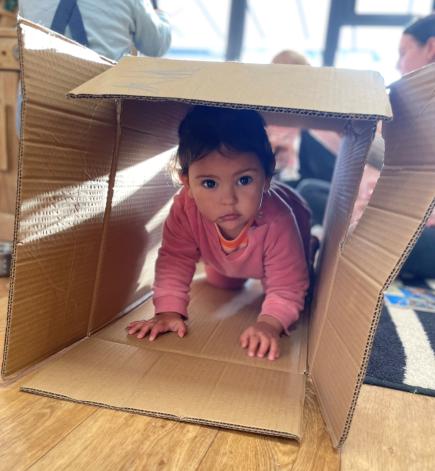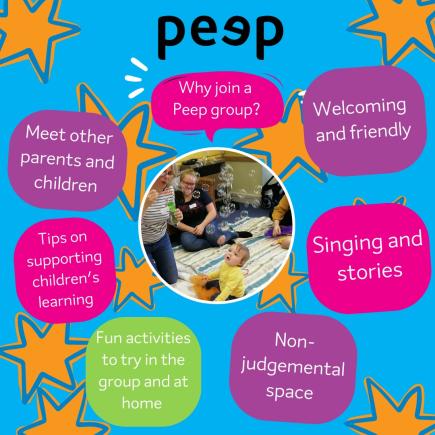how peep supports the home learning environment
The evidence-based Peep Learning Together Programme supports practitioners and parents* with young children’s development and learning, making the most of their earliest years and helping to improve later outcomes. It is widely used across the family support and early years sectors, including Family Hubs. Find out below how our Peep programmes support children's outcomes through a strengths-based approach to working with families, supporting staff development, and providing comprehensive and flexible resources that can be used in universal and targeted delivery.
Peep sessions raise parents’ confidence and awareness about:
- the value of their role and their relationship with their child,
- the simple things they can do in day-to-day life to support learning, and why these things make a difference.
There is compelling evidence that these two interconnected things, sometimes known as the Home Learning Environment (HLE), are fundamental to a good start in life. The human brain is built not born – the 100 billion brain cells that we are born with need to be connected up. Most of these connections are made during the first months and years of life, and are heavily influenced by the child’s relationships and experiences during this period. It's never too late to make a difference but it makes sense to get involved as early as possible. Increasing parents’ understanding contributes to preventative early intervention or more targeted later intervention, helping to narrow the attainment gap in society that is already apparent before children start school.
'The Peep course has really helped my family to bond. We play together much more often.' Peep parent
The Learning Together Programme is comprehensive, with five strands of learning which complement the EYFS (Early Years Foundation Stage) and other early years frameworks: Personal, Social and Emotional Development, Communication and Language, Early Literacy, Early Maths, and Health and Physical Development. Practitioners who attend the 2-day Peep Learning Together Training are given online access to 74 child development topics (each with downloadable session plans and parent handouts), along with extensive implementation support.
Evidence-base:
Peep programmes have been evaluated in a number of independent research studies by the Universities of Oxford, Queen's Belfast and Warwick. These show that Peep:
- helps children develop strong foundations for language, literacy and self-esteem – improving outcomes for all, but with the greatest impact on the most disadvantaged
- successfully reaches families and engages them in their children’s learning
- helps parents become more aware of their children’s development and how to foster it
- enables practitioners from a wide range of professions develop new skills and fresh approaches to unlock parents’ potential, rather than focus on their problems.
'Since I started Peep I talk more with my daughter about what is in the book we are looking at – not just the words. We sing loads and I am beginning to feel more confident with messy play.' Peep parent
The evidence-based Learning Together Programme (LTP) was developed for practitioners to use with parents and their children from birth to school. Increasing parents’ understanding contributes to preventative early intervention or more targeted later intervention, helping to narrow the attainment gap in society that is already apparent before children start school.
'Peep provides a very clear structure to provide key messages and support around learning in the home to parent/carers. The programme content and resources are very comprehensive and of a high standard, and can be delivered flexibly. The training was fun and interesting, with very engaging and experienced trainers. I feel really motivated to start delivering Peep in our locality, along with Family Hub colleagues across Hull.' Catherine, Early Help Team Manager, Hull City Council Family Hub
How the Peep Learning Together Programme is used with families to support children’s outcomes:
Valuing and building on what parents already do:
Peep is a strengths-based approach to working with families. Key child development ideas are discussed during Peep sessions, including how the ideas relate to families’ experiences. Children’s behaviour, for instance, can become easier for parents to manage or re-focus when they understand a bit more about possible causes. The topic on schemas can provide alternative activities for a child who is exploring throwing things, while ‘Mark making’ helps explain why a child might be swirling their food on the table, and suggests other ideas for making marks (sand, mud, playdough, paintbrush and water on the ground, etc). The combination of information with practical ideas helps restore parents’ own patience whilst providing their child with more opportunities to develop their skills through play.
Peep sessions also include songs and story time, and simple, low-cost play and talk activities that can be continued at home. When parents understand more about the benefits of singing, talking, playing and sharing books and stories with their baby or child, and share simple ideas for incorporating them into everyday life, they tend to do more of these valuable activities.
'Peep was very informative and interactive. It has made me more comfortable and confident as a parent. More importantly, I now understand my kids better than before being involved in the sessions.' Peep parent
Delivery format:
The Peep Learning Together Programme was designed to be used flexibly, to suit the needs and interests of all families. Peep sessions can be delivered in groups, in drop-in sessions (e.g. Stay and Plays or child health clinic waiting areas), or in the home or other one-to-one sessions. They can take place indoors, outdoors or online. Peep practitioners (two co-facilitators or a session leader and assistant) decide on the number of sessions in a Peep course, and which of the child development topics to focus on, involving parents' preferences as appropriate.
'Peep was very good. Learnt a lot about the importance of praise and positive feedback, my impact, body language, etc.' Peep parent
Strengthening relationships:
The Peeple principle that ‘relationships are at the heart of learning’ underpins both the practitioner training and Peep sessions with families. Several of the Programme topics focus specifically on supportive and loving parent-child relationships, but nurturing and reflective care underlies all Peep sessions. Practitioners use the ORIM framework to identify Opportunities, Recognition, Interactions and Modelling that parents are doing with their children, building their knowledge and confidence, and helping to strengthen their relationships. Parents are encouraged to share ideas and activities from the session with other family members at home.
In feedback, parents often comment on how much they appreciated the friendships and peer‑to-peer support networks that they and their children develop:
'The discussions within the session – it is never rushed or brushed past. Honest conversations with other parents made me feel better on days where I’ve wondered if it was just me feeling a certain way. The staff are very welcoming and put you at ease.' Peep parent
Universal delivery and accessibility:
In our experience, families from all walks of life benefit from getting to know other families and practitioners, sharing practical ideas and experiences with each other, and finding out about other local services. Being seen to be open to all families can reduce the stigma that is sometimes associated with ‘parenting’ groups. The focus in Peep sessions is on supporting children’s learning and development, which also helps with parents’ sensitivity. As a society we're gradually recognising that groups for parents and children are beneficial for all families. Cross-sector support such as that provided by Family Hubs can really help break down barriers.
Targeted delivery:
Peep programmes can be used or adapted for families with similar needs or circumstances if helpful, such as young parents, dads, foster carers or kinship carers, children due to start nursery or school (transition or school readiness), families with English as an additional language (EAL), parents with post‑natal depression or anxiety, children with delayed speech and language, families with a parent in prison, traveller families, childminders, or families whose children have additional support needs (SEND), etc. While some parents prefer to go to a group that is open to all, others would rather start off with parents that they feel they have more in common with.
Course content can be targeted by age/ developmental stage and/or one or more of the five strands of development. Some Peep practitioners have added in elements that appeal to the families they are working with, such as Peep in the Pool, Cooking Peep or Outdoor Peep. Peep programmes can also be used to complement or follow on from other provision, such as Baby Massage or Peep Antenatal courses, or transition sessions into early years settings.
'Because of Peep I am always looking for opportunities to help my child learn and get new experiences.' Peep parent
Sharing ideas with families beyond direct delivery:
We post Peep activity ideas and tips that support the home learning environment on our Peeple social media platforms (Twitter, Facebook and Instagram, all @PeepleCentre). These are used by parents and practitioners. Peep practitioners can also share Peep handouts on their own social media pages or online groups (e.g. via Whatsapp), as well as printing them.
Quality Assurance and workforce development:
Peep programmes and delivery are quality assured by:
- our evidence-base, findings from wider research, and our delivery model, described in our theory of change,
- our regularly monitored and reviewed training courses, which focus on enhancing practitioners’ theoretical and practical skills, knowledge and understanding about working with parents to support their children’s development,
- the comprehensive, high-quality Programme resources available to all trained practitioners,
- reflections from our own practitioners, and practitioners we have trained around the UK, Ireland and Australia over the past couple of decades, along with those of the families they have worked with,
- accreditation units available to both practitioners and parents,
- post-course delivery support and sharing of best practice, available to Peep practitioners and organisations, including monthly online practitioner support sessions, Peep Champions network, delivery support newsletters, practitioner Facebook group, refresher training, and Members Area on our website.
‘Peep is fantastic for involving parents in their children's learning. It gives parents more confidence to support their children's learning and take it forward at their child's pace and development level.’ Children’s Centre family support worker
Sustainability, value for money and a joined-up approach for organisations:
We have trained practitioners from numerous settings and backgrounds, such as family hubs, children's centres, nurseries, pre-schools, schools, health centres, early help, libraries, family learning, psychology, social care, public health, prisons, museums and community centres. As a charity, we have always prioritised making the training affordable and great value for organisations, providing on-going access to both the Programme materials and delivery support.
Practitioners can be employed or volunteers, including parents who have gone on to become Peep practitioners, sometimes after completing the Peep Progression Pathway accreditation. Peep delivery can be an opportunity for practitioners from different sectors to work together, sharing their complementary skills and experience with families and each other.
‘I find Peep a huge benefit to both myself and the adults that I work with. It's good fun, factual, and understanding that everyone is in the same boat and trying to be the best parents they can be, and that we can support each other.’ Early childhood practitioner, nursery class
* For readability, we use the term ‘parents’ to refer to family members and others with a key caring role.
If you're part of a Family Hub or an organisation working with families, find out more:
> Peep Learning Together Programme
> Peep Learning Together Programme 2-day Training for Practitioners
> Arrange a free Information Briefing for managers and decision-makers
> Arrange In-house Training (online or face-to-face)
> Watch our video 'How Peep Programmes can support your work with families'

find out more or book training
tel 01865 397 970
training@peeple.org.uk
> training courses
> dates & booking
> in-house training
> sign up to our e-newsletter

